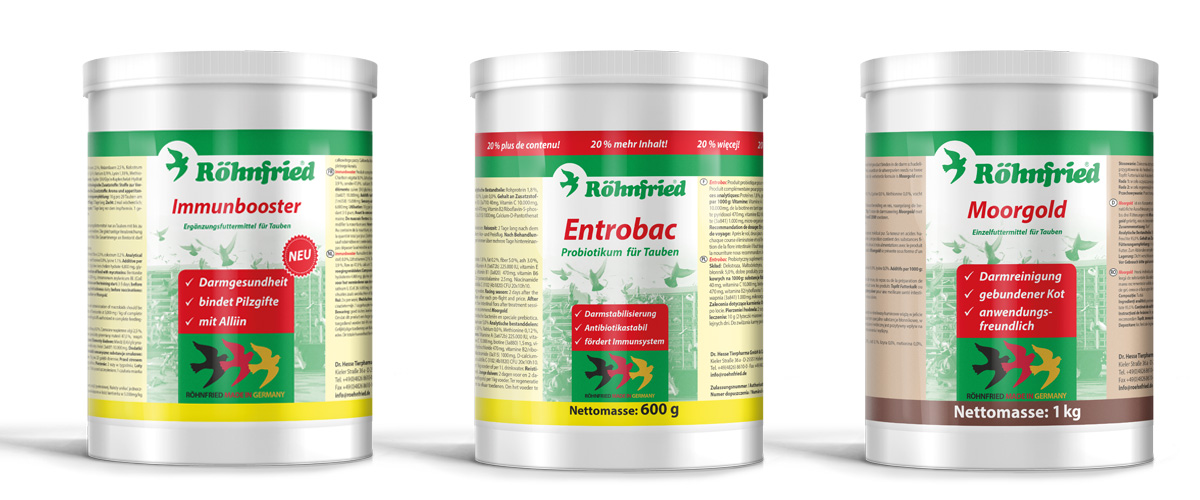
Even the best pigeons cannot reach a top condition when suffering from parasites or an infection. Besides the right hygiene and nutrition, vaccinations are the most important instrument to prevent infectious diseases. A vaccination plan is essential to every loft. It is very important to provide special vaccination dates in the annual care-taking plan. It is also important to prepare the pigeons for the vaccinations. That means they should be in very good health and show no symptoms of illness. Therefore, the pigeons must be treated for parasites before they get the vaccination (ideally 2 to 3 weeks in advance). Additionally, their natural resistance should be boosted. Lots of stress, like heavy training or separation, should be avoided right before and after the vaccination.
Paramyxo vaccination annual plan
In case, the pigeons cannot be checked by the veterinarian for coccidiosis, canker and worms, we suggest to follow this plan:
1. Old pigeons
They should get the vaccination during a rest period, i.e. between the moult and the breeding season, but no later than 3 weeks before the first training flight. When pairing the racing pigeons, too, you should follow this care-taking concept:
- 6 weeks prior to the pairing – canker treatment for 5-7 days + simultaneously Entrobac
- 4 weeks prior to the pairing RO 200 Ready + Immunbooster + Moorgold
- 3 weeks prior to the pairing paramyxo vaccination
Vaccination 3 weeks prior to the pairing ensures the high-degree transmission of the antibodies to the young pigeons. The parasite treatment prevents breeding disorders and avoids infections of the young pigeons. Entrobac, Immunbooster and RO 200 Ready enhance the natural resistance and vitality of the pigeons.
2. Young pigeons
They should always get the vaccination twice during their first year. It is especially important to ensu-re best care and rest of the youngsters in preparation to the vaccination. If the parents were well prepared for the breeding and if the youngsters and their droppings look decent, usually there is no need for a parasite treatment. Any low degree infection by canker or coccidiae stimulates the development of the immune system, and thus has a positive influence on the health of the pigeons. Besides this, it makes sense to keep the infection pressure low by feeding Avidress and Entrobac, which prevents optionally/potentially pathogenic germs immediately after the separation.
In our regard, there are two vaccination concepts for young pigeons:
- First vaccination 5 days prior to the separation. However, the pigeons must be at least 3 weeks old. The second vac-cination is applied 3-4 weeks after the separation.
OR
- First vaccination one week after the separation, as soon as the pigeons got accustomed to their new environment. Apply second vaccination 3-4 weeks after that.
- In any case, one should avoid simultaneous vaccination, and separation of the youngsters. Being separated from the parents and moving into a new environment is a lot of stress to the young pigeons and reduces their resistance.

If the youngsters for any reason should fall ill after the separation, the vaccination should be delayed for 1-2 weeks. However, it is important that they get the second vaccination before the pigeons intensively train and race. 4-5 days before and after the vaccination we suggest to feed Immunbooster + Entrobac + Moorgold in order to stimulate the immune system. You should be aware of the fact that only the correctly vaccinated pigeons can develop a sufficient immunity and that a good preparation to the vaccination can save the pigeons from potentially negative effects.

Dear Sir,
I’m entering youngsters in a one loft pigeon race, how should I prepare the youngsters with vaccinations against Pox, Canker, PMV.
Your advice is very important to me. Please give me advise for my problem.
Thank You.